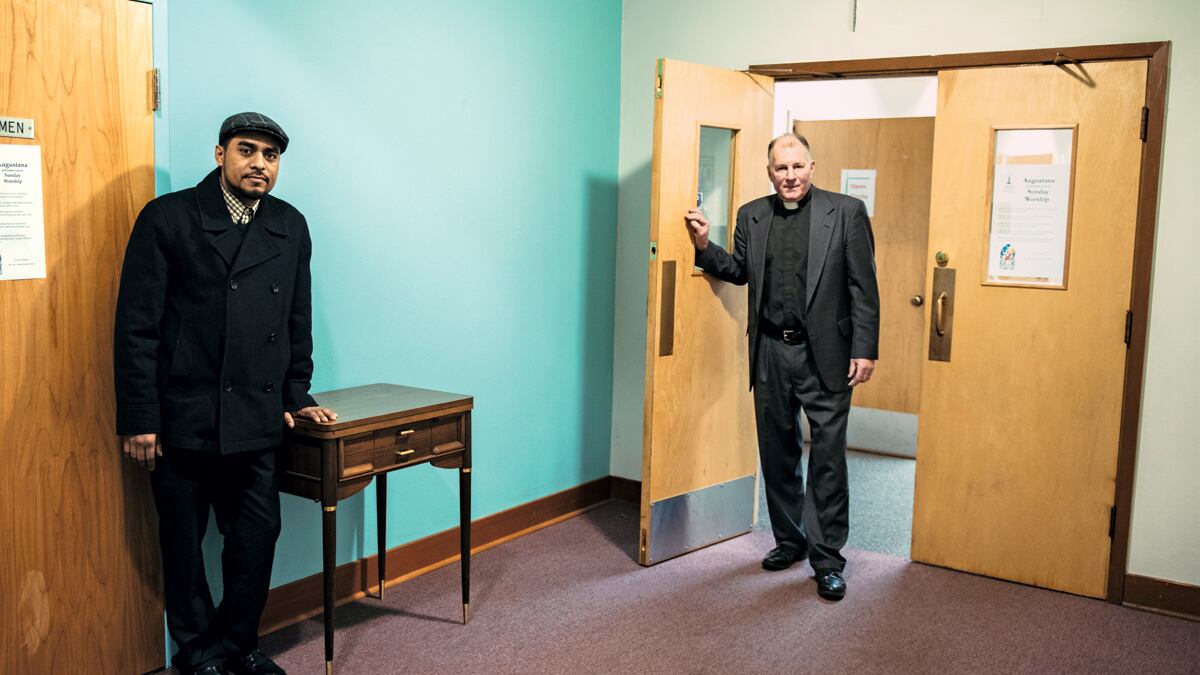Pastor W. J. Mark Knutson has turned his church's steeple into an alarm.
He grabs a thick woven rope dangling from the bell tower of Augustana Lutheran Church at Northeast 15th Avenue and Knott Street. He pulls. Deafening chimes echo against the brick.
"That goes 12 blocks in all directions," Knutson says.
When neighbors and congregants hear the signal, the pastor says, they will know to come and surround the church to physically prevent the deportation of whomever may have taken sanctuary inside.
"We will use our bodies if need be," the pastor says.
As U.S. Immigration and Customs Enforcement escalates deportations of undocumented immigrants under President Donald Trump, Portland churches are preparing to take drastic measures.
Augustana Lutheran Church is preparing to shelter as many as 100 people. It's one of about 30 Portland-area religious congregations that have pledged to offer sanctuary to immigrants in their houses of worship.
Portland's status as a so-called "sanctuary city" has so far offered little practical comfort to undocumented immigrants in the time of Trump.
ICE has increased its arrests surrounding Multnomah County courthouses ("The Ice Storm," WW, Feb. 1). Federal agents arrested 11 immigrant men last week in Woodburn; Oregon Public Broadcasting reported most of them were Guatemalan flower pickers with no prior criminal history. For every such arrest, dozens more rumors ricochet through local immigrant communities.
"If Donald Trump deports as many people as he wants to, and says he will—that's 12 million or so—that would be as if the entire states of Oregon, Washington and Idaho disappeared at 6:30 am because ICE showed up and got them," says Rae Anne Lafrenz of the Interfaith Movement for Immigrant Justice, which coordinates a network of 500 volunteers in the local sanctuary movement from a small office in Augustana's basement. "It sounds like science fiction, but it's true. It's really happening."
That leaves people whose scriptures demand hospitality pondering how to make their places of worship into shelters of last resort for strangers in need.
Augustana is the only local church with direct experience in sheltering someone facing imminent deportation by ICE. In 2014, Augustana harbored an immigrant from El Salvador, Francisco Aguirre, in a basement room for nearly three months and promoted his case to the national news media. Last year, the U.S. attorney's office in Portland dropped Aguirre's "illegal re-entry" charge, but he's still fighting for his right to remain.
He's also promoting sanctuary efforts. "Every day we are afraid to go out," Aguirre says. "We are afraid ICE will wait outside our house to take us into custody and leave our children behind. We will fight. We all contribute to this country and we deserve respect."
No church will say it's currently sheltering immigrants on its property. But dozens are preparing.
Any group seeking to join them must be ready to answer four difficult questions.
1. Are you willing to break the law?
The legal basis for sanctuary is pretty flimsy. ICE policy lists churches, along with schools and hospitals, as "sensitive locations." This doesn't mean agents are barred from entering such locations to conduct investigations or make arrests. It just means agents need special approval to do so.
ICE responded to WW's questions about its policy on "sensitive locations," including churches, by supplying links to its website. The policy was recently updated to remove a clause that said enforcement would not take place in such locations "unless exigent circumstances exist, such as imminent risk to human life."
Anyone who "conceals, harbors, or shields from detection" a foreigner who entered the country illegally—or even attempts to do so—may run afoul of the U.S. Immigration and Nationality Act of 1965. The penalty: 5 to 10 years in prison for each immigrant harbored.
The crucial question of whether a conviction for the crime of harboring requires proving intent to conceal has never been examined by the U.S. Supreme Court. However, the 9th U.S. Circuit Court of Appeals, which oversees Oregon, has interpreted the law more strictly than other courts.
"Technically speaking, where we live, all you have to do is provide food and shelter to be prosecuted," says Gwynne Skinner, a director of the Human Rights and Immigration Clinic at the Willamette University College of Law. Skinner has advised the Catholic church she attends on the legal ramifications of offering sanctuary. "It's very unpredictable what this administration is going to do," she says.
There are also city fire codes and zoning rules to consider, although when stacked up against possible felony charges, these may seem an afterthought. "If there's a crisis, are we going to ask somebody permission? We can't," Knutson says.

2. Whom do you want to shelter?
Different congregations offer different answers. One key question is whether a church shelters only people who share its faith.
"The Latino community is the most visible, and targeted in a particular way," says Katie Dwyer, chairwoman of the justice commission at Ainsworth United Church of Christ in Northeast Portland's Concordia neighborhood. "But there are strong efforts to build bridges with the Muslim community as well."
Skinner, the law professor, says churches will also have to decide what level of criminal offenses they're willing to overlook. The accused are often the first to be deported, although ICE is no longer focusing only on convicts.
"We're not talking about churches providing sanctuary to violent criminals," she says. "We're talking about churches providing sanctuary to people who are undocumented and perhaps have minor immigration violations, out of love."
3. Where are you trying to send people?
Sanctuary congregations also need to decide what their ultimate goals are. Are they seeking to shield targeted immigrants until they can make their case in court? Or to help them flee the country to seek asylum elsewhere?
The choice a church makes here will determine how much publicity it seeks. Lafrenz says congregations have vowed to do everything publicly—"there's nothing secret," she says—but several local clergy hint of other, underground efforts.
"There are people who want to stay below the radar," says Rabbi Ariel Stone of Congregation Shir Tikvah in Northeast Portland, speaking generally. The rationale for secrecy? "Legal boundaries are not respected nowadays. [Congregations] don't want to endanger our ability to do this work by talking about it."
Stone fears that showy proclamations of sanctuary may backfire by giving the feds an easy target. "I would hate the idea that somebody who was offering sanctuary to large numbers of people discovered all they had done was create a collection point for ICE," she says.
Knutson isn't worried about inadvertently assisting ICE. Sheltering immigrants from deportation, he says, is "meant to buy time"—and generate publicity that could be helpful while they make their case.
4. Where will people stay?
Ainsworth United Church of Christ recently voted whether to advertise its sanctuary status by placing a banner on the building. Congregants decided no.
Pastor Lynne Smouse Lopez says that's because her congregation didn't want to make promises they weren't yet prepared to keep. One complication: A possible shelter space in the church basement is currently occupied by a day center for people with HIV and AIDS.
"You need spaces for people to sleep," says Dwyer, a parishioner at Ainsworth. "You need spaces for people to shower. You need spaces where people can be relatively quiet. You also need people to cook meals, and people to provide accompaniment—so someone is at the church building at all times."
At Augustana, Knutson shows a reporter around the sprawling church compound, which spans 24,212 square feet on two stories—plus the bell tower, which Knutson figures could shelter 20 people in a pinch.
Some rooms are already undergoing renovations. The church has installed diaper-changing facilities in the restrooms, and has builders on call to install showers at a moment's notice. If a few families moved in, they might be able to enjoy private rooms, but if more should come, the cavernous underground space—or, indeed, the nave with its rows of pews—could be converted into dormitories.
"Say there was a real crackdown overnight," Knutson says. "That's what church is for. The door is open."

